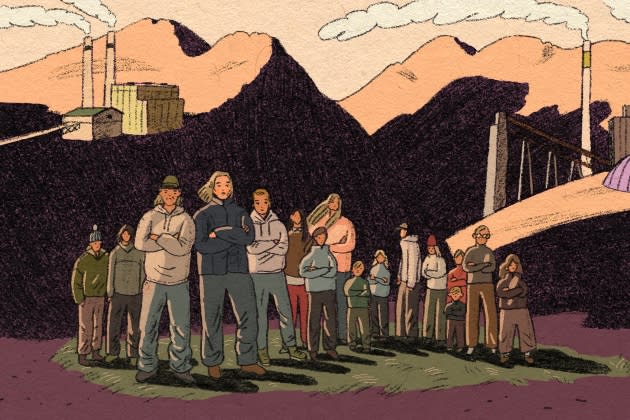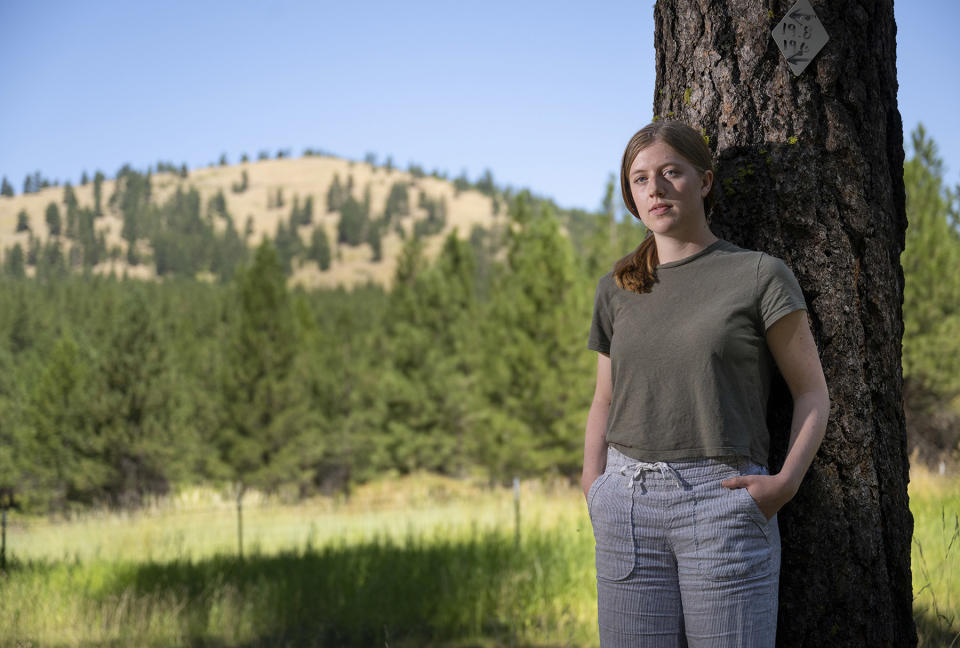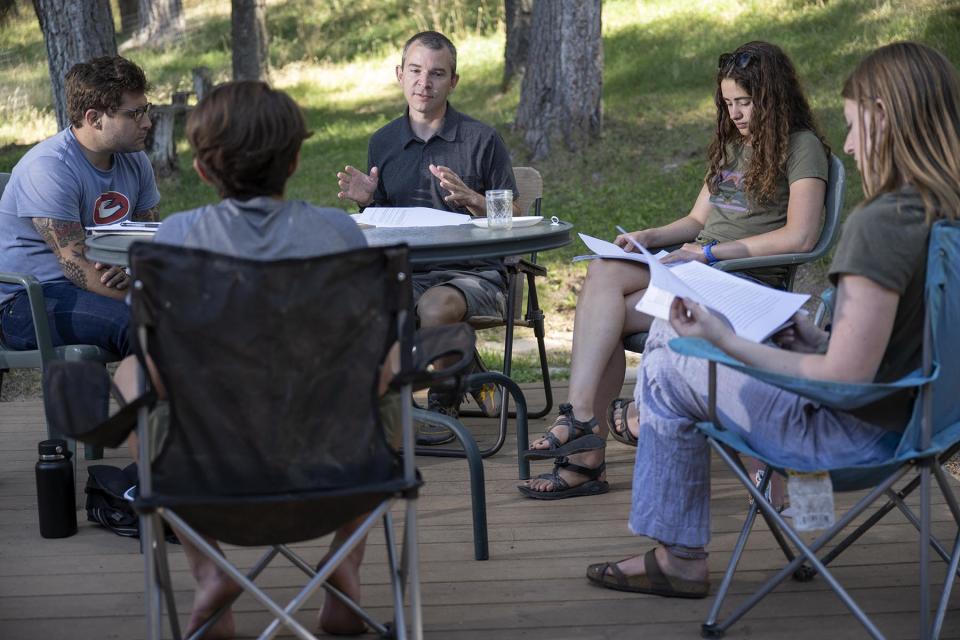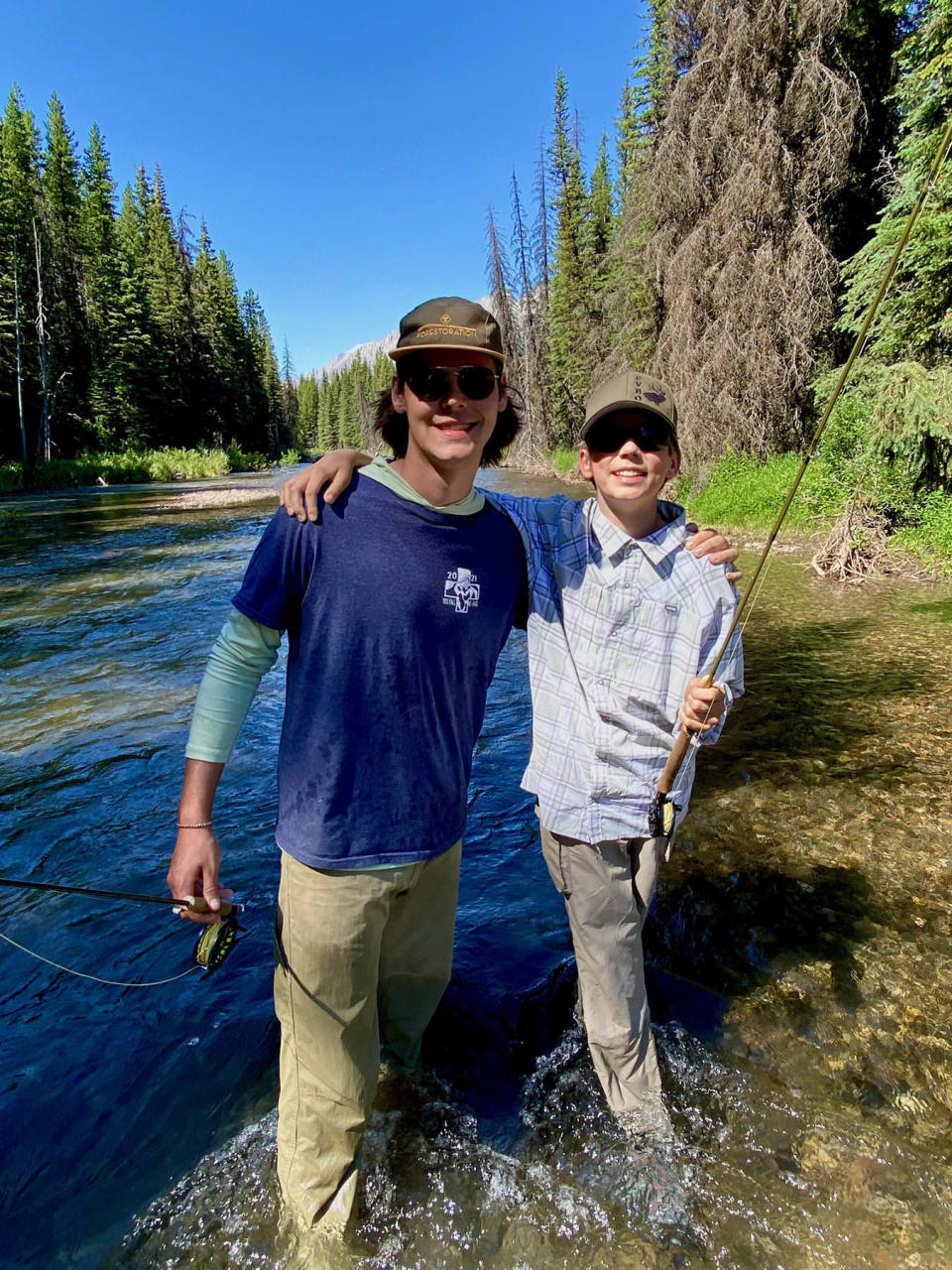Sixteen Kids Are Fighting the Climate Crisis in Court

Grace Gibson-Snyder takes a sip of chai from her reusable mug in the crowded coffee shop. She grew up here in Missoula, she says, “with a love of nature untainted by worry.” Every year on her birthday, her family took her to Yellowstone to hike and backpack. She rafted the Clark Fork that runs through town in the summers and skate skied the snow up a local canyon in winter. A sixth-generation Montanan, this gold-hilled, water-laced landscape shaped her fundamentally.
Close to five years ago in this exact place, she was brainstorming with her mother about a service project at the start of her freshman year in high school. Her mother showed her an article about China ceasing to take the world’s plastic recycling and suggested her daughter choose something environmental for the assignment. That moment was Gibson-Snyder’s first awakening to a planet in peril.
More from Rolling Stone
'How to Blow Up a Pipeline' Is the Hottest Date Movie of the Season
Louisiana's Coastline Is Crumbling. These Tribes Know How to Save it
Fungus Meat? Lab-Grown Halibut? Meet the Scientists Growing Your Next Meal
She suddenly began noticing that thick wildfire smoke choked the skies more frequently in summer, forcing her soccer practice indoors. She went for a hike in Glacier National Park, dipped in a lake at the bottom of a glacier that had existed for thousands of years and was predicted to disappear by the end of this century. By the time a teacher mentioned that the best way to reduce an individual carbon footprint was to forgo having children, she’d already started wondering on her own whether she should have the kids she’d always wanted. How much would her children suffer, and contribute to global suffering? How could this huge decision with such considerations be her burden at only 14 years old? And how was it that none of the adults in the proverbial room were doing anything about this?
At 14, she watched Greta Thunberg’s speech to the U.N. Climate Action Summit, the one where Thunberg said to gathered authorities of the world: how dare you have known for so long that the climate was changing and done so little. How dare you come to the youth for your hope. How dare you steal our childhood and our future like this while you continue to look away. How dare you.
“I remember collapsing, bawling,” Gibson-Snyder says. “She pointed at what I had been feeling. She was able to capture the rage and terror and unfairness of this all in one phrase.”

When Gibson-Snyder was 16, a guest speaker came into the weekly lunch meeting of her school environment club. The speaker talked about a youth climate case that was being put together against the state of Montana for violating its citizens’ Constitutional right to a clean and healthy environment by doubling down on fossil fuels. By then, Gibson-Snyder had begun to understand that agonizing over individual changes like avoiding plastic straws wasn’t the most efficient way to solve the climate problem. “Relying on individuals to change everything about their lives is a misplaced responsibility,” she says, “when it’s governments and corporations — governments enabling corporations — that caused this situation in the first place.”
Gibson-Snyder signed onto the lawsuit as a plaintiff. It felt, finally, like agency. She joined 15 others, ranging in age from 2 years old to 18 and hailing from all over Montana: the doorsteps of Glacier and Yellowstone National Parks, the Flathead Indian Reservation, western cities like Kalispell and east to the rural Powder River. The youngest two plaintiffs suffer from respiratory conditions that leave them vulnerable to the poor air quality of wildfire smoke; their parents signed them onto the suit. Most heard about it through school, friends, or older siblings and signed on themselves.
Now, three years later, that case will finally be heard in June in Montana’s small capitol town of Helena. As the first youth-led climate case to make it to trial, it’s the first time that this generation and their prosecution can lay out a body of evidence for how climate change is impacting environmental resources, how a state’s fossil fuel-driven projects and existing policy violate a constitutional right and knowingly contribute to climate change, and the psychological injuries its children suffer as a result. A similar Utah case was recently dismissed, and a suit against the federal government has been languishing in delays since 2015; in 2020, a federal appeals court “reluctantly” threw it out, ruling that climate change was not an issue for the courts. But Montana is a unique battleground.
It all started in 1972, explains Anne Hedges, director of policy and legislative affairs for Montana Environmental Information Center and an expert witness for the youth. Montana citizens came together to write a new constitution to replace the 1889 governing document that had been written, essentially, to give industry free reign to pillage the landscape. The Constitutional Convention minutes brim with stark examples of disaster. The Anaconda Copper Company smelter stack—one of the tallest brick structures in the world and so wide you could drive a bus around its top—was turning surfaces in Anaconda black with toxic soot. The open pit mine in Butte was filling with deadly acid water. The aluminum plant in the Flathead was spewing fluoride gas that damaged trees and deformed the bones of wildlife. The pulp mill in Missoula, not far from where Grace and I sit now in the coffee shop, was polluting water.
The convention delegates, who actively de-emphasized their political affiliations, wanted to ensure the farming, ranching, and outdoor recreation that shaped Montana would be protected, along with its ecosystems and people. They wrote the strongest language possible, including a Constitutional right to a clean and healthful environment for present and future generations, a right provided in only two other states: Pennsylvania, and as of 2021, New York.
But then came the money. Tax revenue from two enormous coal-fired power plants built in southeast Montana in the 1980s went to programs that helped develop the state. And it went into private pockets, too, of coal companies and lobbyists and legislators. In the early 2000s, Montana environmental groups increasingly raised concerns about climate change in the review process to permit new energy projects; in response, fossil fuel interests convinced the state to simply prohibit those reviews from considering climate change impacts. The fossil fuel industry also convinced the legislature to add provisions specifically promoting fossil fuels to the state’s energy policy — even though state agency reports during those years pointed to fossil fuels contributing to Montana’s shift from a carbon sink to a carbon emitter. As a result, Hedges says, the state has never denied a permit sought by a fossil fuel company. Today Montana is one of the top five coal producers in the U.S. with extraction levels higher than that of entire countries, including Brazil, and total annual emissions from its fossil fuel-based economy are on the order of 166 tons of CO2.

To keep the youth case from going to trial, the state has engaged in a series of aggressive tactics, said lead counsel and Our Children’s Trust lawyer Nate Bellinger. They’ve filed legal motions and practices to attempt to get the case dismissed, including trying to secure a court order allowing them to do independent psychological evaluations for some of the plaintiffs and trying to depose the youngest ones, who are only 5 and 8. And now in the state legislature, Republicans enjoy a supermajority. Montana Republicans have submitted bills in this 2023 session to weaken the Constitutional right to a clean environment and to repeal the state’s energy policy—both statutes at the core of the youth climate trial, and both aimed at making the trial disappear, although it’s unlikely such measures will affect the underlying legal claims of the case.
The attorney general’s office declined to comment, as did the state’s agency and expert witnesses. But based on depositions, the state is likely to argue that the climate is changing less than the mainstream narrative claims, that it’s not caused by humans, and won’t have the dire impacts on Montana alleged by the prosecution; the state’s emissions aren’t significant to global emissions; the plaintiffs themselves are consuming fossil fuels; and that the youth’s psychological impacts are due to the fact that they’re victims of the “apocalyptic rhetoric” surrounding the “faux climate ‘crisis.’”
Melissa Hornbein, a Helena-based lawyer and one of three local counsel on the case, says that while she never wants to predict what a judge is going to do, she thinks the case is fairly straightforward at a legal level in favor of the plaintiffs, given the Constitutional right and the fact that the state knew it was contributing to climate change. And if they win, it’s a precedent-setting case that climate change is, in fact, a court issue. A ruling in favor of the youth could catalyze a domino effect of similar rulings across the country based on rights to life, liberty, and protection of the environment as part of the public trust, making it one of the most consequential lawsuits to the fate of the next American generations.
But Hornbien says there’s also another important issue at the heart of this battle.
“We’re at an inflection point in Montana, with respect to the values that are enshrined in our 1972 constitution, which was frankly one of the most progressive and visionary constitutions of any state in the country. And the time has come for us as Montanans to decide if those are still our values. We’re seeing this at the national level, too, that democracy is not self-sustaining, it’s a decision that has to be made on an almost daily basis. We have a truly unique guiding document in this state. But it’s not going to protect itself.”
NINETEEN NOW, Gibson-Snyder will have spent three years of her youth as part of this case by the time the trial rolls around. After graduating high school, she took a gap year to live in Washington D.C. and accompanied a State Department trip to Jordan, where she put to work the Arabic she learned in high school. She’s back home on break from her first year at Yale, where she aims to study environmental policy. Wearing a white collared shirt under a sweater and her hair in a low bun, poised and articulate, she resembles a young lawyer herself.
In the coffee shop, our conversation has been interrupted twice when the director of Families for a Livable Climate and then the director of Climate Smart Missoula, both of whom she worked with during high school, stop by to say hello. We’d talked about meeting in one of Gibson-Snyder’s favorite outdoor spots instead, perhaps up the canyon, but it’s currently pouring rain in a whiplash swing from the bomb cyclone that dumped snow and record lows on Montana—the kind of extreme swings that climate scientists predict will become more common. Looking out at the rain, Gibson-Snyder talks about what it’s like to grow up “at the wrong time, crunch time as far as the climate crisis goes,” and to live with “the burden placed on us from all sides to be the saviors, the ones who will make it all right again.”
“I’ll spend several weeks focusing on class and friends and then experience days of bone-crushing guilt, thinking what am I doing, why am I spending time on these things [instead of environmental work]. And that is such an invalidating experience. I’m so much more than that as an individual. I have to be [in order] to keep my sanity. I’m an adult now, but I shouldn’t be responsible for the world. It’s so ridiculous to expect these 7- and 12-year-olds to have to persuade the state to protect us so we can have a healthy life, when the entire point of the state is to protect our rights.”
In media around the case, state representatives have called the youth liberal tools being exploited by out-of-state-special interest groups and dismiss their climate-induced psychological burdens as emotional hysteria and irrational thoughts placed in their heads by their parents and hyped-up media. I ask her how it feels to hear those things from the entity that’s supposed to be protecting her.
“It really bothers me to have this pushback from the state when we’re fighting to protect the Attorney General’s children and grandchildren, their land and their home. And the blame—they’re such straw man arguments. It’s not Missoula running this case,” she said, referencing her hometown’s status as the state’s liberal island. “It’s people from all across the state. That’s what gives it such power.”
IN THE FLATHEAD VALLEY, plaintiffs Lander and Badge Busse grew up in an opposite environment from Gibson-Snyder’s community. Evangelical billboards spring from the side of the highway. Although Trumpist Ryan Zinke won Montana’s new Senate seat in 2022, he lost this district—his own home district—in the primary to an even more right-wing opponent. The first house on the Busses’s street in the wooded outskirts of Kalispell is enclosed in an extensive eight-foot fence holding up security cameras and a Q’Anon sign.

Sporting a seventies shag, Lander, 18, looks the part of a retro rock star. Which he may be someday, if he can get a scholarship to study music theory in New York, and when he finishes the post-apocalyptic concept album he’s been mulling. Badge, 15, looks the freestyle skier that he is in baggy jeans and a t-shirt. He’s at the mountain every weekend in winter, determined to ski all the real snow he can before, as his ski coach mentioned recently, manmade snow replaces it. In summer, he’d rather be fly fishing than doing anything else. And in the fall, both boys tote rifles into the forest with their father to bring home game to fill the freezer. Their living room is hung with the antlered skulls of the brothers’ first elk, first deer. Hunting, they explain, is not an extracurricular activity. It’s part of a way of life that’s deeply connected to the land and the health of that land.
Between the hook-and-bullet lifestyle that’s been categorized as generally Republican and their home-ground politics, it’s easy to assume that the Busse boys are conservative, and that the next generation sees climate change as a nonpartisan issue—a trap I find myself falling into in wanting, just as Gibson-Snyder said, to believe that this generation is somehow better than us, can transcend our bitter divides. But the boys describe themselves as left-leaning. In fact, they only speak about the case now to each other, their parents (Sara, a communications consultant, and Ryan, a former conservative and firearms executive who wrote Gunfight: My Battle Against the Industry that Radicalized America, are both left-leaning), and others involved in the lawsuit. Both boys have lost friends over their participation in it, and struggle with how to ride the line between being kids and also part of such a weighty effort. “It’s like living two separate lives,” Lander says.
In 2011, Our Children’s Trust brought another youth climate case against Montana, petitioning the state Supreme Court to declare that the state holds the atmosphere in public trust and must therefore steward it for future generations. When Ryan and Sara heard about it, they described it to their boys, who wanted to sign on. Badge was only 4 at the time, and likely went along with Lander, Ryan said, who even then had a strong sense of justice. That petition was denied on a lack of legal grounds. When this new case came around, “we did not have to talk to either boy,” Ryan recalled. “They did the talking. Both were very keen on being involved and both were very versed on the issues and the case.”
Despite the isolation and threat of persecution, neither brother has questioned their commitment to the case. They’re proud to be part of it. Not winning, Lander says, “would be a complete obliteration of the values we stand for in Montana, and conservation values on a national scale. The people who wrote our Constitution knew the value of the land that we live on, and it’s our job as citizens to uphold those traditions that were written into it. It’s our obligation to be involved in this case, regardless of whatever harm it brings us, emotional or physical.”
Yes, physical. Armed intimidation, they say, is common in the valley. Badge references a 2020 Black Lives Matter rally in Kalispell when a counter-protester pointed an AK-47 at him. He turns to his brother now and says, as if he’s thinking of it for the first time, “I mean, I’m scared of showing up to court [in Helena] and there could be protesters outside.”
Neither of them are particularly worried about being on the stand, though. All the plaintiffs will be at the trial, although the little ones won’t testify. They’ve already been deposed—when the opposing side’s lawyers may ask questions as part of the discovery process before trial. In trying, Badge suspects, to get him to reveal that he actually didn’t spend all that much time outdoors, an attorney asked him several times where exactly his family hunted. He finally replied, “A local never gives up their spots.” They both say that the attorneys tried to corner them on energy questions, like what their house runs on, as if they’re supposed to come up with the solutions for how the state reduces fossil fuel extraction and demand. “That’s the state’s job,” Lander says. “Our job is to hold the state accountable to put in the necessary environmental protections that our Constitution guarantees us.”
I ask the boys what story they want to tell the world with their involvement in this case. Badge talks about rivers depleting, the glaciers that feed them melting until they’re gone, the fish disappearing with them. He describes the aching pain always in the back of his mind that he must savor every moment that his own kids may never experience.
Lander thinks for a while. Then he says, “You don’t hear about all the civil rights cases that failed before Brown vs Education. It’s the landmark decision that starts the trickle down. The story is what comes after we win, and what I hope to see my generation and others accomplish after it.”
Best of Rolling Stone

